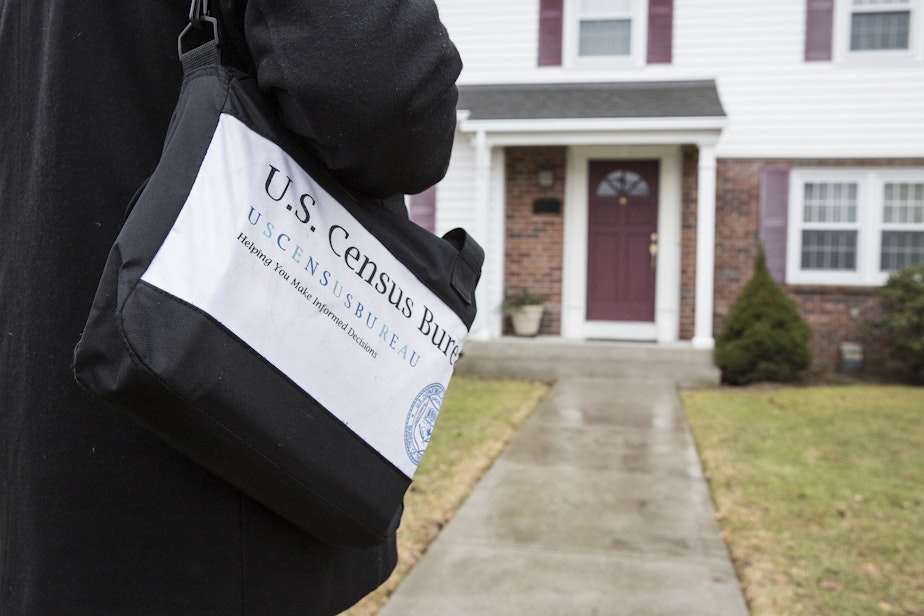2020 Census kicks into high gear next month with state taxpayer assist

The once-every-ten-years census count of everyone living in the United States starts next month, beginning with remote villages in Alaska. West Coast states are spending local tax dollars to boost the response when their turn comes beginning in March.
Oregon, California and Washington all budgeted millions of dollars of state taxpayer money to supplement the federal census effort. Most of that money is being pushed out in grants and contracts to community-level groups such as nonprofits, cities, libraries and tribes.
"We are trying to mobilize messengers who are trusted within the community, to reassure the community, to explain to the community about why this is important," said Lisa McLean, the 2020 Census coordinator for Washington state. "We think that's going to be the most effective."
McLean said the stakes are high, which is partly reflected in the naming of the state and local alliances as "Complete Count" committees. Census numbers guide the distribution of billions of federal dollars and determine how many congressional seats each state gets.
Oregon is on track to gain an additional U.S. House seat through reapportionment after 2020 if current population projections hold. An additional seat would raise Oregon's House delegation from five to six. Washington state gained an additional House seat after the 2010 Census and is not expected to get another this time around. California is on the cusp of losing one seat in Congress based on current projections.
Sponsored
California has made the biggest commitment of state resources to make sure hard-to-reach populations are counted in the 2020 Census. The $187 million budget for the California Census Office dwarfs the spending by any other state for this purpose.
Washington and Oregon's state-level Complete Count committees are also richly funded compared to most other states. The Washington Legislature allocated $15.5 million toward 2020 Census activities. Oregon seeded its Complete Count Committee with $7.7 million. Some large state governments in the South such as Texas and Louisiana are spending nothing on census promotion, reasoning that this task belongs to the federal government.
"This is a federal responsibility and a civic duty, but it is also a competition. It's a competition for federal funds that are allocated on formulas and there are only so many seats in Congress," said Marc Baldwin, an assistant director in the Washington state budget office. "So, it is in the state's interest to make sure the count is as complete and accurate as possible."
California and Washington state will spend a relatively small portion of their census budgets on TV and radio advertising. Baldwin anticipates that no Washington taxpayer money will be spent to hire people with clipboards to go door-to-door enumerating residents. He said that job remains solely in the federal domain.
The state and local Complete Count committees operate independently of the U.S. Census Bureau although they share common goals.
Sponsored
"We're fortunate to have a lot of cooperation from state and local governments," said U.S. Census Bureau regional spokesman Toby Nelson in an interview in Olympia on Friday.
Some of the planned state-funded activities include establishing questionnaire assistance centers, community organizing and outreach, social media promotion of the census, translation and printing of fact sheets in at least 13 foreign languages, and set up of electronic message boards.
The census count, allocation of House seats and electoral votes are based on total state populations, irrespective of citizenship. The decennial count includes prison inmates, green card holders, guestworkers, foreign students, people living in homeless camps and migrants in the country illegally. A controversial citizenship question that the Trump administration wanted to include on the 2020 Census was dropped after New York’s attorney general and civil rights groups won a federal court case, which went all the way to the U.S. Supreme Court earlier this year.
The 2020 Census will be the first to offer an online option for Americans to respond. In mid-March, most Pacific Northwest households will get a letter in the mail inviting them to go online to fill out their census questionnaire. In most cases, the Census Bureau doesn't plan to mail a traditional paper questionnaire unless a household fails to respond online or by phone by the second week of April.
Once the census questionnaire portal opens in March, Nelson said the Census Bureau will publicly post real-time -- or nearly real-time -- response rates down to the neighborhood level.
Sponsored
"We know that a lot of people are interested in making sure their communities are counted, so we want to be as transparent with that information as possible," Nelson said.
Census Day is April 1, 2020, and serves as the reference date for how many people live at a given location.
Baldwin said real-time response rate data could guide a big "final push" by his state and its local partners to encourage people who had until then ignored the 2020 Census. He said allied groups were discussing how to rapidly deploy teams to areas with low response rates. [Copyright 2019 Northwest News Network]

